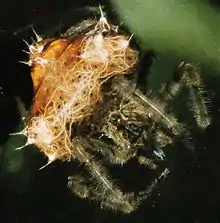Cladomelea
Cladomelea is a genus of African orb-weaver spiders first described by Eugène Simon in 1895.[2] Adult females of the genus are bolas spiders, capturing their prey with one or more sticky drops at the end of a single line of silk rather than in a web. Males and juvenile females capture their prey directly with their legs.[3]
| Cladomelea | |
|---|---|
 | |
| C. debeeri | |
| Scientific classification | |
| Domain: | Eukaryota |
| Kingdom: | Animalia |
| Phylum: | Arthropoda |
| Subphylum: | Chelicerata |
| Class: | Arachnida |
| Order: | Araneae |
| Infraorder: | Araneomorphae |
| Family: | Araneidae |
| Subfamily: | Cyrtarachninae s.l. |
| Genus: | Cladomelea Simon, 1895[1] |
| Type species | |
| C. longipes (O. Pickard-Cambridge, 1877) | |
| Species | |
|
4, see text | |
Species
As of April 2019 it contains four species:[1]
- Cladomelea akermani Hewitt, 1923 – South Africa
- Cladomelea debeeri Roff & Dippenaar-Schoeman, 2004 – South Africa
- Cladomelea longipes (O. Pickard-Cambridge, 1877) – Congo
- Cladomelea ornata Hirst, 1907 – Central Africa
References
- "Gen. Cladomelea Simon, 1895". World Spider Catalog. Natural History Museum Bern. Retrieved 2019-05-13.
- Simon, E (1892). Histoire naturelle des araignées. doi:10.5962/bhl.title.51973.
- Levi, H.W. (2003). "The bolas spiders of the genus Mastophora (Araneae: Araneidae)". Bulletin of the Museum of Comparative Zoology. 157: 309–382.
This article is issued from Wikipedia. The text is licensed under Creative Commons - Attribution - Sharealike. Additional terms may apply for the media files.